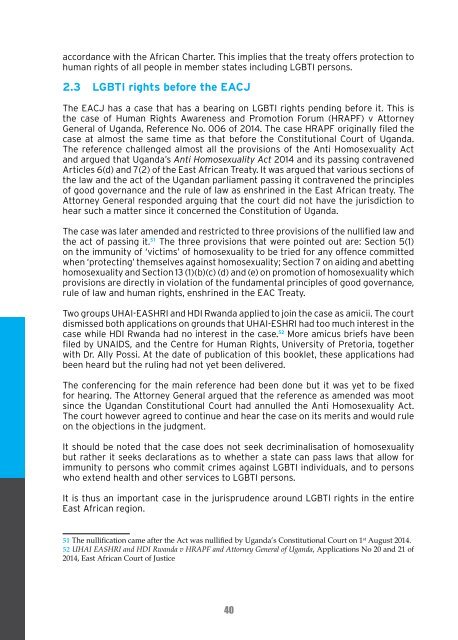PERSONS IN UGANDA
4Tks5WfQb
4Tks5WfQb
You also want an ePaper? Increase the reach of your titles
YUMPU automatically turns print PDFs into web optimized ePapers that Google loves.
accordance with the African Charter. This implies that the treaty offers protection to<br />
human rights of all people in member states including LGBTI persons.<br />
2.3 LGBTI rights before the EACJ<br />
The EACJ has a case that has a bearing on LGBTI rights pending before it. This is<br />
the case of Human Rights Awareness and Promotion Forum (HRAPF) v Attorney<br />
General of Uganda, Reference No. 006 of 2014. The case HRAPF originally filed the<br />
case at almost the same time as that before the Constitutional Court of Uganda.<br />
The reference challenged almost all the provisions of the Anti Homosexuality Act<br />
and argued that Uganda’s Anti Homosexuality Act 2014 and its passing contravened<br />
Articles 6(d) and 7(2) of the East African Treaty. It was argued that various sections of<br />
the law and the act of the Ugandan parliament passing it contravened the principles<br />
of good governance and the rule of law as enshrined in the East African treaty. The<br />
Attorney General responded arguing that the court did not have the jurisdiction to<br />
hear such a matter since it concerned the Constitution of Uganda.<br />
The case was later amended and restricted to three provisions of the nullified law and<br />
the act of passing it. 51 The three provisions that were pointed out are: Section 5(1)<br />
on the immunity of ‘victims’ of homosexuality to be tried for any offence committed<br />
when ‘protecting’ themselves against homosexuality; Section 7 on aiding and abetting<br />
homosexuality and Section 13 (1)(b)(c) (d) and (e) on promotion of homosexuality which<br />
provisions are directly in violation of the fundamental principles of good governance,<br />
rule of law and human rights, enshrined in the EAC Treaty.<br />
Two groups UHAI-EASHRI and HDI Rwanda applied to join the case as amicii. The court<br />
dismissed both applications on grounds that UHAI-ESHRI had too much interest in the<br />
case while HDI Rwanda had no interest in the case. 52 More amicus briefs have been<br />
filed by UNAIDS, and the Centre for Human Rights, University of Pretoria, together<br />
with Dr. Ally Possi. At the date of publication of this booklet, these applications had<br />
been heard but the ruling had not yet been delivered.<br />
The conferencing for the main reference had been done but it was yet to be fixed<br />
for hearing. The Attorney General argued that the reference as amended was moot<br />
since the Ugandan Constitutional Court had annulled the Anti Homosexuality Act.<br />
The court however agreed to continue and hear the case on its merits and would rule<br />
on the objections in the judgment.<br />
It should be noted that the case does not seek decriminalisation of homosexuality<br />
but rather it seeks declarations as to whether a state can pass laws that allow for<br />
immunity to persons who commit crimes against LGBTI individuals, and to persons<br />
who extend health and other services to LGBTI persons.<br />
It is thus an important case in the jurisprudence around LGBTI rights in the entire<br />
East African region.<br />
51 The nullification came after the Act was nullified by Uganda’s Constitutional Court on 1 st August 2014.<br />
52 UHAI EASHRI and HDI Rwanda v HRAPF and Attorney General of Uganda, Applications No 20 and 21 of<br />
2014, East African Court of Justice<br />
40


